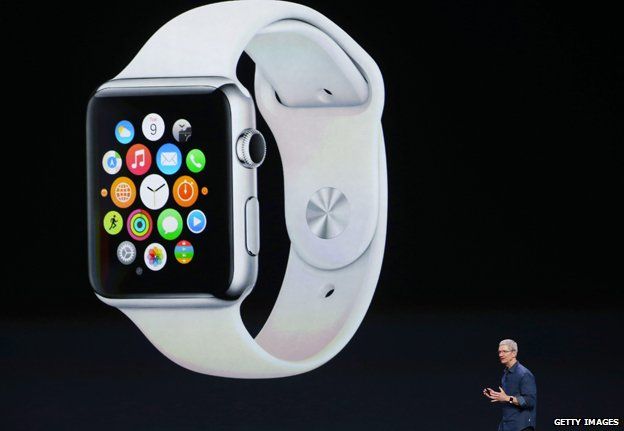Who wants a smartwatch?
- Published
- comments

The big trend in computing this year is the move from staring at your phone to glancing at your wrist. Once the Apple Watch is released in April, the smartwatch sector will really take off. Or at least that is the received wisdom.
But some figures released this week by the research firm Canalys should give us pause for thought. They show that just 720,000 Android Wear devices were shipped in 2014, out of a total of 4.6 million smart wearable bands, which include fitness trackers such as the Fitbit and the Jawbone Up.
To be clear, the Android Wear platform was the big new thing in smartwatches in 2014, launched at Google's I/O conference with lots of hoopla along with new products like the Motorola 360 and the Samsung Gear 2.
But it seems hardly anybody was interested in having one of the watches. Google gave away tens of thousands of the devices to I/O attendees and to its own staff, so the number of people actually buying one with their own money was even lower.
Meanwhile, the Pebble smartwatch which really kickstarted the whole idea a couple of years ago had sold a total of one million by the end of the year - great for a start-up business, but hardly earth shattering.
Having worn an Android Wear device on and off over the past few months I think I know what the problem is. The gadget in question, the Moto 360, is the best-looking of the latest smartwatches but I still can find little reason to remember to put it on each morning.
It needs charging each day, and the information it delivers to my wrist - "364 unread emails", "new Twitter activity" - does not save me any time or prove particularly useful. I'm sure if I took the time to fiddle with the settings I could improve matters, but somehow I can't be bothered. And the device does not even have the "wow" factor that Google Glass - despite its obvious imperfections - still retains when I wear it. Nobody stops me and asks to have a go on my smart watch.
Of course, the argument goes, all that will change when the Apple Watch arrives. A JP Morgan analyst is predicting that more than 26 million will be sold this year, which would instantly make it as dominant in this sector as the iPod was in MP3 players. With 400 million people owning the kind of iPhone that would be compatible with the Watch, that does not seem an outlandish forecast.
So I am convinced that Apple will be the giant of the smartwatch sector within a couple of months. What I'm less clear about is whether clever watches are anything more than a niche product for gadget fans and fitness addicts - unlike smartphones which are becoming essential for everyone.
Apple's Watch will also need to be recharged overnight, and we have little clue yet as to how its apps will work and what compelling new reasons it will give us to look at our wrist rather than pulling out a phone.
Now, similar doubts preceded the launch of Apple's iPad - sceptics said there just wasn't room for that kind of device in the market. That proved wrong - at least in the short term - and this time it is safe to bet that smartwatch shipments for 2015 will be many times higher than those for last year. But let's wait until we see whether sales accelerate again in 2016 before we celebrate the dawn of the smartwatch era.